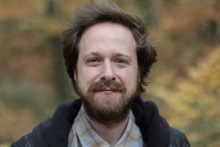Foraging for locally and spatially varying resources

Charles Mullon
Department of Ecology and Evolution, University of Lausanne, Switzerland
Link to seminar: https://umontpellier-fr.zoom.us/webinar/register/WN_EK3K9P2CSxitCou7eRyz7w
In patch- or habitat-structured populations, different processes can lead to diversity at different scales. While spatial heterogeneity generates spatially disruptive selection favoring variation between habitats, local competition can lead to locally disruptive selection promoting variation within habitats. So far, almost all theory has studied these two processes in isolation. In my talk, I will go over a model where we investigate how resource variation within and between habitats influences the evolution of variation in a consumer population. We find that locally and spatially disruptive selection typically act in concert, favoring polymorphism under a significantly wider range of conditions than when in isolation. But when patches are small and dispersal between them is low, kin competition inhibits the emergence of polymorphism, especially when driven by local competition. We further use our model to discuss what comparisons between trait and neutral genetic differentiation (QST/FST comparisons) can tell about the nature of selection. Overall, our results help understand the interaction between two major drivers of diversity: locally and spatially disruptive selection; and how this interaction is modulated by the unavoidable effects of kin selection under limited dispersal.
Recent publications:
1 Schmid et. al, 2022, Foraging for locally and spatially varying resources: Where exploitation competition, local adaptation and kin selection meet, BiorXiv,
2 Weyna et al, 2022, Hybridization enables the fixation of selfish queen genotypes in eusocial colonies, Evolution Letters
3 Flintham et al., 2021, Dispersal alters the nature and scope of sexually antagonistic variation, The American Naturalist
François Rousset (ISEM) francois.rousset@umontpellier.fr


